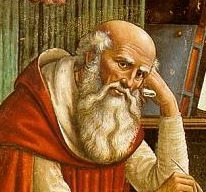Last time I posted about reading. In a moment of weakness I picked up and read The Da Vinci Code. I know that my dear friends Matt and Sarah were discussing the literary merits of this book recently, and I will not judge this book on its literary merits except to say that I, personally, did not like his writing style. However, I do have certain complaints to make from a purely historical perspective. Dan Brown made a number of errors in his description of the Bible and its history, a few of which were absolutely egregious. I do not mind someone believing that perhaps parts of our received history differ from reality (as a Latter-day Saint, I have necessarily different view on the transmission of Apostolic authority, for example). There is, however, no excuse for making factual errors that thirty seconds with a decent encyclopedia would clear up. I understand that sometimes license can be taken here and there, and I am willing to extend to the book such license (i.e. that there actually was an historical Priory of Zion, the the documents revealing its secret history were anything but the most obvious of forgeries, et cetera), but I am less comfortable with the egregious factual errors I found in this book. There are three such egregious errors that I identified in The Da Vinci Code. I realize that by posting about this topic I am playing write into Dan Brown's hands, but I couldn't help myself.
The first is the idea that Amun is ram-headed and associated with fertility. There were Egyptian gods who were associated with fertility (such as Min, who is always pictured holding his erect phallus) and there were ram-headed gods. There were even Egyptian ram-headed gods associated with fertility, such as Khnum. Khnum was occasionally associated with Amun-Ra Sonter, whi ch I assume is Dan Brown's point, but to say that Amun is a ram-headed fertility god is wholly wrong. Amun means 'hidden', and Amun is usually depicted as a man with the the double feather crown on his head. He was worahipped as a god of hidden power and after being syncretized with Ra, the generative power of the sun, which I suppose could have some fertility issues (of course, The Da Vinci Code is about fertility
ch I assume is Dan Brown's point, but to say that Amun is a ram-headed fertility god is wholly wrong. Amun means 'hidden', and Amun is usually depicted as a man with the the double feather crown on his head. He was worahipped as a god of hidden power and after being syncretized with Ra, the generative power of the sun, which I suppose could have some fertility issues (of course, The Da Vinci Code is about fertility in the modern sense, meaning sex, and not about pregnancy, children or any of those other ideas associated with ancient fertility). I have included a picture of Amun for my readers not as acquainted with Egyptian crowns, as well as of Khnum for comparison. Khnum, and not Amun is the god that Dan Brown's hero meant, but unfortunately Khnum doesn't anagram as prettily as Amun. The other error associated with these gods is claiming that Khnum was the consort of Isis, which he was not. Isis' consort is Osiris, which is extremely important, because there is an entire myth cycle surrounding Osiris and Isis. Incidentally, Osiris is not ram-headed either, being a mummiform figure of an Egyptian king. He was associated with fertility, since Isis rather
in the modern sense, meaning sex, and not about pregnancy, children or any of those other ideas associated with ancient fertility). I have included a picture of Amun for my readers not as acquainted with Egyptian crowns, as well as of Khnum for comparison. Khnum, and not Amun is the god that Dan Brown's hero meant, but unfortunately Khnum doesn't anagram as prettily as Amun. The other error associated with these gods is claiming that Khnum was the consort of Isis, which he was not. Isis' consort is Osiris, which is extremely important, because there is an entire myth cycle surrounding Osiris and Isis. Incidentally, Osiris is not ram-headed either, being a mummiform figure of an Egyptian king. He was associated with fertility, since Isis rather
famously conceived Horus after Osiris was killed by his brother.
The next concern was actually the most egregious error in the book, an error so terrible that I read it twice in disbelief. The above concern is something of a specialist problem, since iconographic representations of Egyptian gods is a somewhat esoteric field, so it would be possible to make a mistake in this regard. An important conceit of this book is the concept of a secret history of Christianity that They don't want you to have which is recorded in ancient books suppressed by the Catholic church. This is the idea that the gnostic gospels such as the gospel of Philip have primacy over the canonical ones. This isn't an egregious error since there are scholars, such as Elaine Pagels, who actually believe such things. These are the same types of people who get excited over books like the Gospel of Judas, even though it was obviously written hundreds of years after Christ's ministry. No the error was in identifying how we know about these things. When our heroes go visit the grail expert he has a fascimile copy of the Nag Hammadi codices and the Dead Sea Scrolls, which, he claims, contain the real history of Christianity that the Church doesn't want the world to know. There is nothing Christian about the Dead Sea Scrolls, since they were written before the birth of Jesus Christ. The Dead Sea Scrolls can't describe a Church that worships the 'divine feminine,' because the Dead Sea Scrolls are about a Jewish sect that certainly didn't worship anything feminine. The Community was male, celibate, and had more in common with certain later Christian priests than with any group that practices the hieros gamos. Confusing the Dead Sea Scrolls with early Christian documents and then lumping them together with the Nag Hammadi documents merely because both were archives discovered in the early Twentieth Century is an enormous mistake, and I think the worst committed by Dan Brown. There is no way around the fact that he just got his facts wrong.
Which brings us to the third error. This one actually had me out of my seat in surprise. When discussing what documents the Holy Grail contains they mention that it contains Q, the actual written words of Christ. I laughed out loud at this one, since it shows that Dan Brown was passingly acquainted with Q theory, but missed the whole point. Q is a theoretical sayings source, which scholars believe was likely oral. No Q scholar would ever expect to find the Q document, because it doesn't actually exist! Seriously, there could have been a source that Matthew and Luke used independent of Mark, but you wouldn't find it written down, because it is a theoretical reconstruction. It sounds like Dan Brown heard of Q and thought that is was supposed to be a written sayings source that was used by the gospel writers. Regardless, by suggesting it was a document, our author showed his ignorance.
I had other issues, primarily with omissions and misconstructions of obvious facts, but those three were the biggest. I am sorry if you like this book, but I cannot in good conscience recommend this book. I think it is a sensationalist attempt to cash in on the liberal scholarship of certain New Testament scholars. I appreciate your putting up with my little rant. These things are important to me.
Excelsior!


